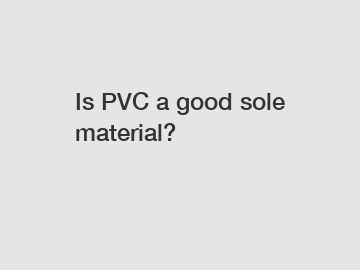Dec. 22, 2023
Shoes & Accessories
When it comes to choosing the right sole material for footwear, there is often a debate about the merits of various options. One such material is PVC (polyvinyl chloride), which has gained popularity due to its affordability and versatility. However, there is a need for a critical evaluation of PVC's attributes to determine whether it truly makes for a good sole material. In this blog post, we will delve into the characteristics of PVC soles, considering aspects such as durability, comfort, environmental impact, and performance. By the end, you will have a clearer understanding of whether PVC is a suitable choice for your footwear needs.
Durability and Longevity:
When assessing the quality of PVC soles, durability is a vital factor to consider. PVC has proven to be a robust material that offers longevity. Its inherent resistance to water, chemicals, and abrasion contributes to the prolonged life span of footwear made with PVC soles. However, it is important to note that the quality of PVC used in the manufacturing process plays a significant role in determining the overall durability of the final product. Inferior quality PVC may suffer from brittleness, leading to premature cracking or sole breakage. Thus, it is crucial to look for footwear that utilizes high-grade PVC to ensure long-lasting durability.

Comfort and Fit:
Comfort is paramount when selecting footwear, and the choice of sole material is central to achieving this. PVC soles have the advantage of being lightweight, which enhances overall comfort. Additionally, PVC is a highly flexible material, allowing the soles to mold to the shape of the foot over time. However, it is worth noting that PVC lacks the breathability of natural materials like leather or certain synthetic alternatives. Consequently, prolonged wear of PVC-soled footwear may result in excessive perspiration and discomfort. To mitigate this, manufacturers often incorporate ventilation systems within PVC soles to improve breathability and overall comfort.
Environmental Impact:
The environmental impact of PVC production has long been a subject of concern. PVC is not a naturally occurring material, and its production involves the use of harmful chemicals and energy-intensive processes. However, great strides have been made in recent years to improve the sustainability of PVC production. Environmentally conscious manufacturers are adopting safer production practices, utilizing recycled PVC, or even exploring alternative eco-friendly materials. When considering PVC as a sole material, it is crucial to prioritize brands that demonstrate a commitment to sustainability and responsible manufacturing.
Performance:
PVC soles exhibit commendable performance qualities, making them suitable for a range of footwear requirements. The material's excellent slip resistance is particularly advantageous in ensuring grip and stability, especially on smooth surfaces. Furthermore, PVC soles are highly resistant to oil, making them suitable for work or industrial environments where potential exposure to oil or grease is a concern. However, it is important to note that PVC may not perform as well as some other materials in extreme temperatures. Extremely hot or cold conditions can impact the flexibility and integrity of PVC soles, potentially compromising their performance.
Conclusion:
In conclusion, PVC soles offer a combination of durability, comfort, and performance attributes that make them a feasible choice for various types of footwear. With their impressive resistance to water, chemicals, and abrasion, PVC soles have the potential to provide long-lasting durability. However, it is essential to choose products that utilize high-quality PVC to avoid premature cracking or breakage. Comfort-wise, PVC's lightweight nature and flexibility contribute to a reasonably comfortable experience, although breathability may be compromised. It is also crucial to consider the environmental impact of PVC production, and to choose brands that embrace sustainable practices. Lastly, PVC soles demonstrate commendable performance qualities, but their performance in extreme temperatures may be less reliable.
By weighing the pros and cons outlined in this blog post, you can make an informed decision regarding the suitability of PVC as a sole material for your specific footwear needs. Remember to consider your individual preferences, the intended use of the footwear, and the environmental implications associated with PVC production.
Are you interested in learning more about wholesale insulating rubber boots supplier, rubber boots supplier, food processing boots? Contact us today to secure an expert consultation!
Previous: Which Slip-Resistant Safety Boots Provide the Best Value for Money?
Next: EVA Boot Buying Guide: Find the Perfect Pair for Unbeatable Comfort!
If you are interested in sending in a Guest Blogger Submission,welcome to write for us!
All Comments ( 0 )